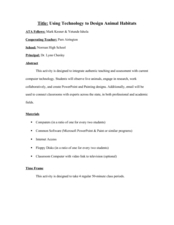Curated OER
Habitats
Students identify butterfly habitats. In this butterfly habitats lesson, students read and discuss Where Butterflies Grow. Students study pictures and guess which are butterfly habitats. Students list the life needs of butterflies and...
Columbus City Schools
Get Your Organisms Organized
From large to small, show your class how to organize them all! Included within the guide is everything you need to take their knowledge of classification from the cellular to the species level. The worksheets focus on...
Curated OER
Using Technology to Design Animal Habitats
Students study the relationship between an animal and where it lives. In this habitats lesson students research to obtain data and create a professional report.
Curated OER
Habitat Lesson
Third graders define specific habitats that animals live in through research and reading. They also have been introduced to Hyperstudio and have had a chance to create a stack of cards, as well as other features of this program.
Curated OER
Animal Habitats: 1st Grade
Learning about animal habitats can be a lot of fun. This lesson focuses on how God created different habitats to suit different animal needs. Students will conduct library research in order to create a five page habitat slide show using...
NOAA
Deep-Sea Ecosystems – Entering the Twilight Zone
Imagine an ecosystem without any light or oxygen, where living things convert carbon dioxide into food. This ecosystem is thriving and might just be the largest ecosystem on our planet, yet we know very little about it. The lesson...
American Museum of Natural History
Welcome to the Dzanga-Sangha
One ecosystem is home to numerous habitats—how diverse are they? Pupils interact with an online lesson to explore three habitats in a rain forest ecosystem. They discover connections between species and how they depend on each other for...
NOAA
Fishy Deep-sea Designs!
Oceans represent more than 80 percent of all habitats, yet we know less about them than most other habitats on the planet. The instructor introduces the epipelagic, mesopelagic, bathypelagic, twilight, and midnight zones in the ocean....
NOAA
Deep-Sea Ecosystems – Life is Weird!
A pool of brine in the deep sea can be up to four times as salty as the surrounding sea water. The deep sea ecosystem relies on chemosynthesis and the organisms that live there are often strange to us. The lesson focuses on researching...
National Wildlife Federation
Massive Migrations
Turn your students into flocks of migratory birds for this fun lesson on animal migration. Prior to the activity, the teacher creates four different migration routes in the classroom or any available open space, labeling nesting...
ARKive
Species Discovery
How do you classify a newly discovered species? Learners view a presentation and complete research about biodiversity and the classification hierarchy. The lesson includes activities with dichotomous keys and work on classifying both...
National Wildlife Federation
The Tide is High, but I’m Holding On… Using ICESat Data to Investigate Sea Level Rise
Based on the rate of melting observed from 2003-2007 in Greenland, it would take less than 10 minutes to fill the Dallas Cowboys' Stadium. The 17th lesson in a series of 21 has scholars use the ICESat data to understand the ice mass...
Curated OER
Introducing Habitats and Biodiversity
Students identify habitats in Arizona. Theys define and illustrate a food web, and explain the importance fo biodiversity.
Curated OER
Habitats
Second graders identify characteristics of various habitats. In this habitats lesson, 2nd graders read Where the Forest Meets the Sea and Swimmy to identify the settings of different habitats. Students construct murals of different...
Curated OER
Where Did They Come From?
Give science learners nine questions about the biogeography of hydrothermal vents and turn them loose to research this fascinating habitat. Working in cooperative groups, they prepare a report that addresses each of the questions. A...
Curated OER
Sea Horse Habitats
Students research sea horses around the world. In this sea horse habitats activity, students use the Internet to take a virtual tour of a sea horse in its natural habitat. Students work in groups to study a geographical...
Curated OER
My Habitat
Students explore the environment they live in. In this habitats instructional activity, students define habitat and create a web in kidspiration. Students take a walk outside and record what they see and hear and may take pictures as...
Curated OER
Learning About Animal Shelters for Earth Day
Learners explore habitats. in this ecology and animal habitat instructional activity, students listen to the book A House is a House for Me by Mary Ann Hoberman. Learners discuss the basic needs of animals and go on a nature walk to...
Curated OER
Animal Habitats
Students research an animal and their habitat. In this animal habitat lesson, students observe a WebQuest that describes the different habitats: deserts, tundra, rainforest, forest, and ocean. They determine which habitat their animal...
Curated OER
Happy Habitats
Students explore different habitats. For this habitat lesson, students investigate four different habitats through participating in a WebQuest. Students create an animal web using Kidspiration or a video documentary upon completing the...
Curated OER
Life in the Crystal Palace
Marine biologists research sea ice communities. Assign some groups to construct paper models of sea ice communities in winter, and some to construct models of them in summer. The lesson is simplistic, but the Internet resources provided...
Curated OER
Earth's Heavenly Treasures: Hummingbirds
Young ornithologists watch an informative video and use the Internet to gather data about the life, size, habitat, and migration of hummingbirds. The interdisciplinary lesson includes activities that target art, science, math, and...
Curated OER
Habitats of the World
Students discover that the Earth supports many different animal habitats. In this habitat lesson students research different habitats of the world. Students show how the animals in their habitat are adapted.
Curated OER
Pollinator Habitats
Students read and discuss background information included with this lesson. They brainstorm the best sources for developing a list of native or migratory pollinators. Students work in groups to design habitats based on information...























